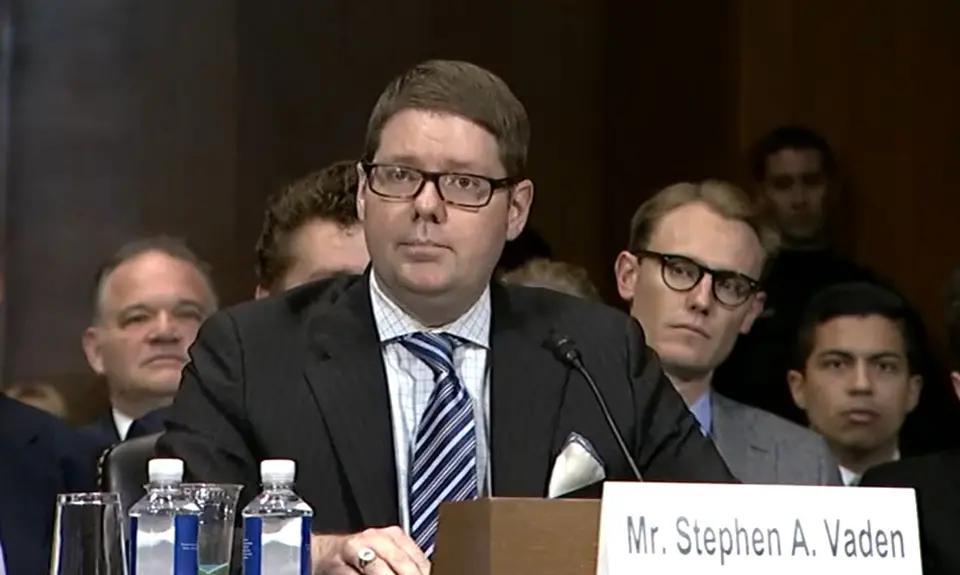On January 31, 2019, President Trump nominated Stephen Vaden to the U.S. Court of International Trade. The Senate Judiciary Committee held Vaden’s hearing on November 13, 2019 and reported him to the full Senate on January 16, 2020. Floor votes aren’t yet scheduled. People For the American Way wrote to senators to express our opposition to the Vaden nomination. You can download our letter here.
Dear Senator:
On behalf of our 1.5 million supporters nationwide, People For the American Way strongly opposes the nomination of Stephen A. Vaden to the U.S. Court of International Trade (CIT). The issues that our organization traditionally deals with generally do not include international trade. But since the purpose of Vaden’s nomination appears to have little if anything to do with that subject, we oppose what is clearly another assault on the integrity of our federal court system.
As a threshold matter, the Senate should not be processing this or any other lifetime judicial nominee of this president. President Trump started this year under the cloud of impeachment for actions undermining the core foundation of our constitutional democracy: free and fair elections. But because the Senate engaged in a cover-up rather than conduct a legitimate trial, that cloud not only remains, but it has also grown to cover the Senate majority as well.
The CIT is a highly specialized court with nationwide jurisdiction over civil actions arising from the customs and international trade laws of the United States. Its members have tended to have a great deal of directly relevant experience before being nominated. That is not the case with Stephen Vaden, who has never litigated a matter involving international trade and who is not even admitted to practice before the CIT.
What he does have is a background working to advance the interests of the elite and powerful at the expense of all Americans, particularly with respect to the right to vote. He has been a member of the Federalist Society since 2005, and he has defended a number of voter suppression schemes by his fellow Republicans. For instance, he defended North Carolina’s notorious and intentionally discriminatory voter suppression law that was found by a court to “target African Americans with almost surgical precision.”i He defended Ohio Republicans when they reduced early voting opportunities in a way that disproportionately harmed African Americans.ii He also defended Ohio laws that made it easier to reject absentee and provisional voters’ ballots for not being a perfect match with voting records; narrowed the window after the election for absentee voters to cure errors with their envelopes; and restricted the ability of precinct poll workers to help voters.iii
In written questions for the record, Sen. Feinstein asked Vaden if he had ever worked on a matter in which he argued in favor of expanding voting access rather than limiting it. Vaden was unable to provide any examples. The closest he came was two cases from 2011-2013 representing a union defending its expulsion process for members with ties to organized crime, which he characterized as “defend[ing] the integrity of the Union’s elections.”iv
More recently, as general counsel at the Department of Agriculture, he has collaborated in the highly anti-democratic effort to build a federal workforce that ignores science and puts personal loyalty to Donald Trump over loyalty to the nation, our laws, and our Constitution. His office was consulted on the administration’s decision to relocate the department’s Economic Research Service and National Institute of Food and Agriculture from Washington, DC, to Kansas City. This move to pressure scientists into leaving the department rather than uprooting their lives and families was highly successful.v The Union of Concerned Scientists called it a “blatant attack on science” and part of Trump’s “systematically hollowing out USDA’s ability to produce objective science.”vi The department’s inspector general concluded that the move may have been in violation of congressionally-mandated budget restrictions.vii But as general counsel, Vaden dismissed those restrictions as unconstitutional, even though the department had previously accepted them as binding.viii This incident—and Vaden’s collaboration in it—cannot be viewed in isolation, but as part of a much larger pattern that subverts our nation’s democratic protections.ix
If confirmed to the Court of International Trade, Vaden would be eligible to sit by designation on cases in other Article III courts, which address legal issues he has a record on. Under questioning from Democratic members of the Judiciary Committee, Vaden disclosed that administration officials had discussed this possibility with him. He claimed that the CIT is his “primary” interest.x The CIT is located in New York, within the Second Circuit, which has no current or anticipated vacancies for the administration to fill. Confirming Vaden to the CIT would give him access to that and other Article III courts.
As the Senate continues to process President Trump’s judicial nominees, we urge senators to oppose Stephen Vaden.
Sincerely,
Marge Baker
Executive Vice President for Policy and Program
